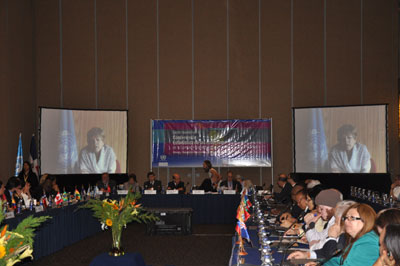Reliable and Timely Statistics Are Essential for Making Public Policies to Deal with Crisis
Work area(s)
Authorities and experts meet in the Dominican Republic to analyse the challenges of statistics in Latin America and the Caribbean.

(16 November 2011) The Sixth meeting of the Statistical Conference of the Americas of ECLAC (SCA-ECLAC) was opened today with more than 60 delegates present from 28 countries in Latin America and the Caribbean and representatives from international organizations. This meeting reaffirms the importance of having reliable and timely economic, social and environmental statistics in the countries in the region in order to deal with the international turmoil in the best way possible.
During the meeting, which is being held in Bávaro, Dominican Republic, ministers, directors of national statistical offices, officials from other public institutions and central banks, and specialists from international organizations will discuss the development of environmental statistics, the 2010 round of population censuses and the future challenges of national statistical systems in three seminars during the Conference, which will end on Friday 18 November.
Alicia Bárcena, Executive Secretary of ECLAC took part in the opening of the Sixth meeting of SCA-ECLAC via a recorded video message. In her message, the senior official of the United Nations emphasized the importance of statistical data as a key tool for public policymaking.
"The State requires statistical information which is useful for designing appropriate policies, as well as evidence which enables monitoring and continual evaluation of the impact of such policies," she stated.
Ms. Bárcena acknowledged the significant progress made by the region in this area and presented the pending challenges, including institutional strengthening of national statistical systems, overcoming technical constraints, producing regular short term information -in particular relating to economic fluctuations and crime- and creating a statistical basis for more comprehensive evaluation of development, particularly in areas such as macroeconomic aggregates, labour indicators and poverty statistics.
She highlighted in particular the meeting on regional and bilateral cooperation regarding the national statistical system of Haiti which will be held as part of this Sixth Conference, in which it is hoped to agree on mechanisms to collaborate with this country in conducting the 2013 population census and strengthen the capacity of Haitian statistics.
Juan Temístocles Montás, Minister of Economy, Planning and Development of the Dominican Republic, stated that this meeting is a new opportunity for revising and redesigning regional statistical plans.
"This meeting is being held at an important time for statistical systems in Latin America and the Caribbean since we are dealing with what many consider a loss of confidence in official statistics at international level in many countries in the world," he said. "We need reliable and timely statistics which enable us to monitor not only the magnitude of the direct impact of the crisis, but also to identify the opportunities which may arise and detect the changes which develop internally in our economies and societies," he added.
Pablo Tactuck, Director of the National Statistical Office of the Dominican Republic and Chair of the Executive Committee of SCA-ECLAC, highlighted the work accomplished by the different working groups which are part of the Conference, which have made progress in institutional strengthening, environmental and gender statistics, censuses, national accounts, information and communication technologies, as well as Millennium Development Goals monitoring, among others.
During the Sixth meeting of SCA-ECLAC delegates from the countries plan to adopt the Code of Good Practice which promotes independence of statistical systems and an institutional framework which ensures the availability of human resources and financing, among other important issues relating to the production of quality statistics.
See also:
- Words by Alicia Bárcena, ECLAC Executive Secretary (in Spanish)
- Speech by Pablo Tactuck, Chair of the Executive Committee of SCA-ECLAC (in Spanish)
More information on the Sixth Meeting of the Statistical Conference of the Americas of ECLAC (SCA-ECLAC) is available on the ECLAC website.
Any queries should be addressed to the ECLAC Public Information and Web Services Section.
E-mail: dpisantiago@cepal.org; Telephone: (56 2) 210 2040.
Follow us on: Twitter, Facebook, Flickr and YouTube.
Related content
Sexta reunión de la Conferencia Estadística de las Américas de la Comisión Económica para América latina y el Caribe (CEPAL)
Por Alicia Bárcena, Secretaria Ejecutiva de la CEPAL
Country(ies)
- Latin America and the Caribbean
Contact
Public Information Unit
- prensa@cepal.org
- (56 2) 2210 2040
